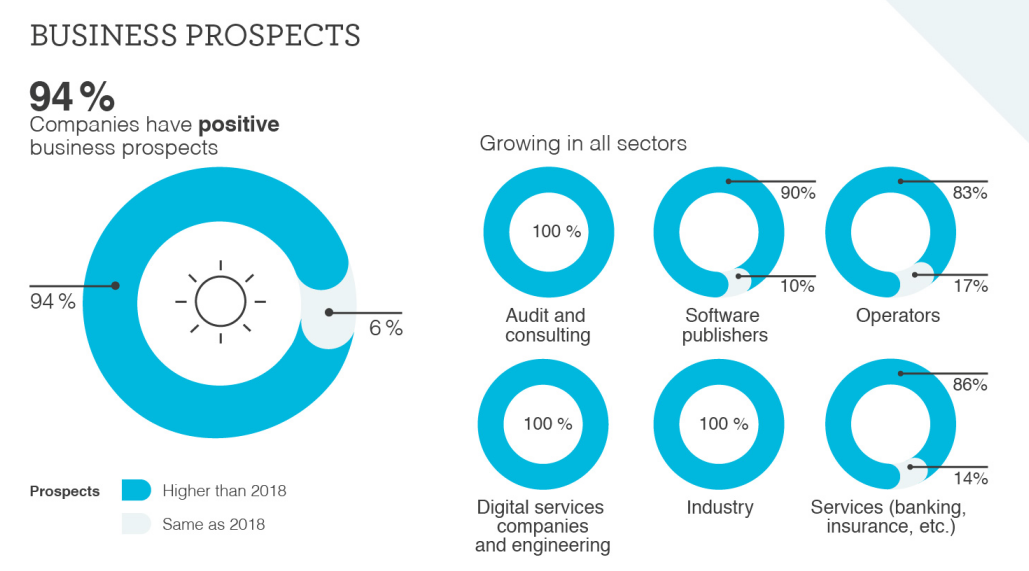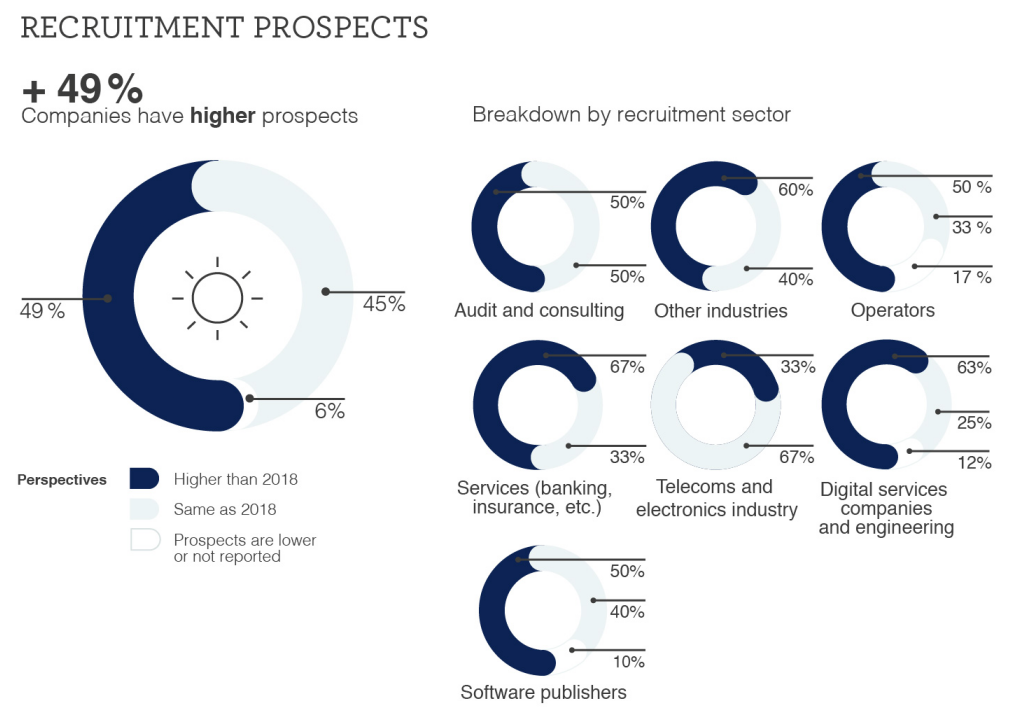IMT publishes its 11th Barometer of digital professions 2019
Since 2009, IMT has been conducting business tendency surveys with companies to identify trends in recruitment in the digital sector for the current year.
Big Data skills, Cybersecurity and AI among top needs
Employers in the IT sector anticipate equivalent hiring trends to last year. Artificial intelligent is now among the most sought-after skills.

The economic slowdown in recent months is not expected to have much of an impact on the recruitment of engineering graduates in digital technology in 2019. At least this is what was revealed by our study, conducted on January 10th at the Telecommunications Forum organized by students from three of our schools (*).
The barometer, published for the eleventh consecutive year, shows that business confidence levels remain high. An overwhelming majority of companies (94%) anticipates business to increase, while the remaining companies expect business to be stable. ESN (ex SSII), digital services companies, software publishers, consulting firms, telecoms and electronics industries are all extremely confident.

However, this does not mean they will maintain the same levels of recruitment. Overall, the hiring prospects for 2019 are equivalent to those reported in our 2018 barometer. Across all sectors, 49% of companies expect to recruit more and 45% expect recruitment to remain the same as in 2018 (compared with last year’s perspectives of 50% and 44%, respectively).
Recruitment in digital service companies and engineering consulting groups is continuing at the same levels. As in 2018, 63% report they are hiring more. For Segula Technologies, for example, 4,700 individuals are expected to join the company in 2019, including approximately 2,000 in France. The numbers are just as impressive for Sopra Steria, with 3,800 positions expected to open this year for the entire group, as in 2018. These plans are the result of business growth and staff turnover, which is historically high in this sector.
Audit-consulting: very active
Audit and consulting firms are also maintaining a solid pace. 50% expect to hire more this year and the other half expects to hire just as much as in 2018. Figures have been virtually stable over the past year.
Telecom operators have the same optimistic perspective. After slowing down last year, recruitment is expected to increase. Half of companies expect an increase in recruitment. This percentage is the same among software publishers. 50% report that recruitment is increasing but this is 25 points down on in 2018.
After creating numerous jobs in recent years, the software industry appears to be slowing down in an economic context that is less favorable. For example, Amadeus (management software, 4,000 employees) is expected to reduce its job offers after an exceptional year in 2018, with 480 people hired in Sophia Antipolis (France).
As this talent war rages on, a few promising start-ups are joining the ranks. In January, 20 start-ups were present in the dedicated area at the Telecommunications Forum to attract engineering candidates. Novaquark, a video game studio and editor is currently looking for 10 developers in Paris.
In the future, it will also be hiring a team to lead its Canadian development center in Montreal. Dxomark Image Labs, which already employs 50 staff, helps to attract dozens of engineers. This independent laboratory specialized in measuring image quality issues internationally-recognized rankings.

A lack of cybersecurity experts
As in previous years, companies’ needs were focused on “studying ad developing software and networks”, closely followed by “architecture and engineering”. These two professional categories represent one third of recruitment needs. “Consulting” professions for all sectors represented 13% of needs. Professionals in “deployment and operation” were the most sought-after by telecom operators (16%), digital services companies and engineering consultants (13%).
Skills related to “Data science” remain in highest demand. For the companies in our barometer, this area represents 10% of needs. This percentage is as high as 12% for audit/consulting firms. Big Data experts are also very popular among telecom and electronics industries (10%) and engineering consultancy (9%).
In general, all companies, including Naval Group (formerly DCNS) and Algolia (cloud search engine) are seeking to add “data scientists” to their teams. Algolia, a growing company, recently created a team of data specialists and is planning to hire around one hundred new employees in France. This data specialist initiative reflects the trend towards “pooling” groups of experts rather than distributing them in different departments.
Moving towards the Factory of the Future
Companies continue to fight for cybersecurity specialists. These rare skills represent 8% of requests with highs in audit/consulting (10%) and industry (10%). For the consulting firm Magellan Consulting (approximately one hundred new employees hired in 2019), the pressure on this profession will continue to rise: “Beyond the need to comply with stricter standards, our clients’ executive managers have a greater awareness of the threats and are investing to increase the security of their information systems.”
In the high-tech industry, these profiles are also priority targets. Naval Group is seeking cybersecurity specialists to ensure the security of its data and ship communications and future ultra-connected equipment.
According to Segula Technologies, this trend of expanding cybersecurity teams will become even more pronounced as “factories of the future” emerge. Thanks to the IoT and smart manufacturing, digital technology in industry will lead to ubiquitous connectivity and data sharing. To reach their full potential, these sites for industry 4.0 will need protection from cyber-attacks. Overall, the industry of the future is now a growing topic among audit/consulting firms and digital services companies. Augmented reality, 3D printing, embedded systems… All these professions are expected to be in high demand in the automotive and aeronautics sectors, for example.
AI: a priority among recruiters
Engineers who can incorporate artificial intelligence in their projects will be on top of the world. Representing 8% of skills needs, AI has become an HR priority. This is particularly the case among digital services companies and engineering consultancy firms (9%).
At Sopra Steria, an AI team of 15 people is already working on several projects. It is not the only digital services company starting to work in this field of the future. Audit/consultancy firms also take this topic very seriously. According to our study, AI already represents 11% of the skills needs in this sector. For consultants, this area has become unavoidable. They must support their clients, including major companies that are rapidly becoming digitized, resulting in the transformation of their professions and organizations.
To meet these challenges, consulting firms, like PWC in France, must increase their collaboration with start-ups. Innovative SMEs, which are more “agile”, are ahead of the game. Shift Technology, a platform founded in 2015 that helps insurance companies detect fraudulent claims has already integrated AI in its solutions.
In 2019, it aims to double its workforce, focusing its efforts on hiring developers, Big Data experts… And, of course, AI engineers.


















